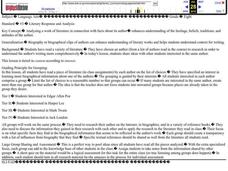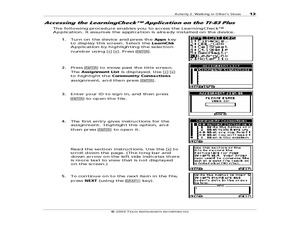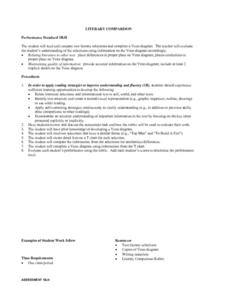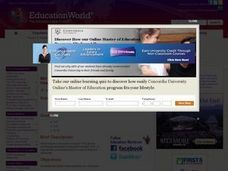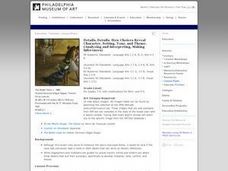Curated OER
The Effects of Slavery
The emotional and spiritual oppression of slavery in the African-American experience is the focus of this instructional activity. Middle schoolers analyze various texts by Frederick Douglass and Maya Angelou related to freedom and...
Curated OER
Introducing Jane Eyre
"How can a magazine reflect a particular time and culture?" Using this prompt, your class explores the Victorian Era as it relates to Charlotte Bronte's Jane Eyre. They can also play the "Victorian Women's Rights" game for the year 1840...
Curated OER
Children's Media and Censorship
High schoolers form opinions about children and television censorship after analyzing literature. They complete a journal writing activity to identify the topic and make a list of inappropriate television shows for children. Next, they...
Curated OER
Macbeth News Broadcast
Here is an authentic assessment task for Shakespeare's Macbeth. Young literature scholars prepare, perform, and record a news broadcast about the major events in the play. For example, groups may choose to report on the death of Lady...
Curated OER
Literary Response and Analysis
Ninth graders analyze a work of literature about an author. In this biography analysis lesson, 9th graders research an author and work in groups to discuss the author with other students. Students research and discuss the authors Edgar...
Curated OER
Crane, London, and Literary Naturalism
Students read London's "To Build a Fire" and Crane's "The Open Boat" and compare and contrast the authors' style as they explore the genre known as American literary naturalism.
Curated OER
Data, Data, Everywhere... and What Am I To Think?
Students demonstrate good random sampling techniques for data collection, select and develop graphic presentations of data and analyze the data to solve a problem presented.
National Endowment for the Humanities
Language Analysis Based on Stave 1
Class members meet the original scrooge, the Dickens character whose name has become synonymous with a cold-hearted, tight-fisted, miser. Using the provided worksheet, readers closely examine context clues to determine the meanings of...
Curated OER
Using Drama to Examine Communities: Walking in Others' Shoes
Encourage your readers to make connections between texts with this resource. After compiling notes for each text read (you choose the texts), groups craft skits in which major characters from each text meet. There is a rubric for the...
Maryland Department of Education
The Concept of Identity Lesson 4: The Psychological Approach
Readers apply Sigmund Freud's theories of the unconscious mind and the psychological approach to literary criticism to analyze and evaluate the relationship between two characters in A Separate Peace.
Curated OER
Literary Comparison
Compare and contrast two pieces of literature with this lesson. With the use of a Venn diagram, pupils make connections between literature and real-life situations. They practice skills of surveying a text looking for important details,...
Maryland Department of Education
The Concept of Identity Lesson 2: The Historical/Biographical Approach
"How does our environment shape our identity?" After researching biographical information about John Knowles and considering how these experiences are reflected in A Separate Peace, class members consider the strengths and weaknesses of...
Curated OER
Everyone's a Critic: Analyzing Sitcoms as Cultural Texts
Start by defining the word sitcom with the goal of launching a discussion. What exactly is a sitcom? How is a sitcom different from sketch comedy, drama, and reality television? Class members give examples, remember storylines they've...
Curated OER
Stir Up a Character Analysis Recipe
What ingredients make up a character? A cup of honesty, a dash of humor, a pinch of cynicism? Based on real cookbooks they review in class, learners at any grade level three and up write recipes to describe characters familiar to your...
Curated OER
Cityscapes
A perfect resource for an art teacher of any grade. First, click on the resource's second tab, entitled "Activities," to find four unique grade-specific lesson all based on the theme of cityscapes. Each activity utilizes the included...
Curated OER
Lesson: Unmonumental: Final Projects
If you've used any of the New Class Museum lessons exploring the theme, Unmonumental, then check this out! Included are three different final project ideas that tie into the other seven Unmonumental lessons. Kids create community through...
Curated OER
Exploring Race Through Literature
Provide your class with an opportunity to examine race through a variety of literary works. They read and analyze a chosen poem, interview, speech, or story describing race in America. They then use key words from the original work to...
Curated OER
Shakespearean Comedy on Film
This lesson will focus on the aspects of Shakespeare's comedy that become more evident in performance. By viewing clips of the same Shakespeare scene in different film versions, high schoolers have the opportunity to engage in a close...
Curated OER
The Witch of Goingsnake
Students complete literary analysis and writing activities using The Witch of Goingsnake. In this literary analysis lesson plan, students interpret a proverb, read poems, complete a quaker reading, and complete research for the lesson...
National Endowment for the Humanities
The Glass Menagerie: Impact of Expressionism
Young scholars are challenged to write a realistic analysis of Tennessee Williams' nonrealistic memory play, The Glass Menagerie. Writers use the evidence gathered on their worksheets to craft an effective thesis and concluding statement...
Curated OER
Speak: Questioning Strategy - ReQuest Strategy
The best way to analyze a piece of literature is to ask questions about the characters, plot, and theme. Encourage your learners to stump the teacher with the most difficult questions they can create using Bloom's Taxonomy and various...
Curated OER
The Old Man and the Sea: Anticipation Guide
Begin your unit on Ernest Hemingway's The Old Man and The Sea with an anticipation guide. As kids read 12 statements that relate to the novel's themes, they decide whether each is true or false in their own opinion.
EngageNY
Grade 9 ELA Module 1, Unit 2, Lesson 2
Class members continue their analysis of Letters to a Young Poet, paying particular attention to how Rilke uses metaphor to develop his ideas about the source of inspiration.
Curated OER
Details, Details: How Choices Reveal Character, Setting, Tone, and Theme. (Analyzing and Interpreting, Making Inferences)
Students respond to works of art. In this art interpretation lesson, students examine images of art while using concepts they learned as they read literary pieces. They detail the setting, characters, and the mood and theme of the works...
Other popular searches
- Literary Analysis Plot
- Literary Analysis Paper
- Literary Analysis for Poetry
- 9th Grade Literary Analysis
- Literary Analysis on Quotes
- Writing Literary Analysis
- Literary Analysis the Hobbit
- Test for Literary Analysis
- Literary Analysis Pocahontas
- Writing a Literary Analysis
- Literary Analysis Essay
- Literary Analysis Plays






